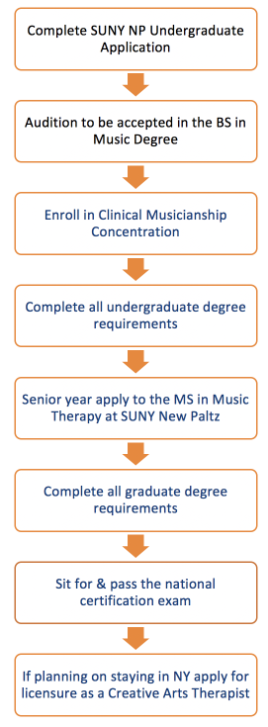BS in Music -Concentration in Clinical Musicianship
What is the BS in Music with a concentration in Clinical Musicianship
This is a degree program designed for undergraduate students who want to study music therapy. This degree program prepares undergraduate music students to apply for the Master of Science Degree in Music Therapy at SUNY New Paltz.
What courses will I take?
Students enrolled in the Clinical Musicianship concentration will take music courses, required general education courses, and psychology courses. In addition, students will take the following preparatory music therapy courses:
- MUS 250 Music Therapy Overview - An overview of music therapy’s history, definition, methods, practices, clinical populations, models, and education & training requirements
- MUS 328 Inclusive Conducting and Arranging - Basic conducting, music arranging, and ensemble directing skills are presented. In addition, students will learn adaptive and inclusive techniques for application with a variety of individual and group music making contexts, including expressive movement.
- MUS 345 Psychology of Music - Introduction to the psychology of music. Topics include the physical, psychological, physiological, socio-cultural, and health aspects of music experience across the lifespan.
- MUS 353 Clinical Applications of Music I - A survey of receptive and re-creative music experiences used at the supportive level of music therapy practice.
- MUS 354 Clinical Applications of Music II - A survey of clinical songwriting and improvisation methods used at the supportive level of music therapy practice.
- MUS 462 Clinical Musicianship - Students will learn clinical techniques on instruments currently used in music therapy practice. Playing techniques for instruments and vocal traditions from a variety of cultures will be explored.
- MUS 484 Music Therapy Observations - On-site observation of practicing MT-BC and introduction to use of music therapy methods in a clinical setting. Sixty (60) hours during the semester at an approved facility, plus weekly seminar on campus. On-site evaluation by music therapy faculty as needed.
When am I eligible to apply to the MS in Music Therapy?
Music students in the clinical musicianship concentration are encouraged to apply to the MS in Music Therapy at SUNY NP during the senior year of their undergraduate studies. To apply, students complete the application, submit 3 letters of recommendation, write a short essay outline career goals, and upload a video performance of two contrasting pieces demonstrating musicality. Students are invited for an interview with the music therapy faculty after submitting all required application documents.
The Path to Becoming a Music Therapist

Music Therapy
What is music therapy?
Music therapy is the clinical & evidence-based use of music interventions to accomplish individualized goals within a therapeutic relationship by a credentialed professional who has completed an approved music therapy program (AMTA, 2015).
Who are music therapists?
Music therapists are musicians, who have a passion for using their talents to address health needs and improve quality of life for individuals across the life span. Currently there are approximately 9.000 board certified music therapists in the United States.
What do music therapists do?
Music therapists assess emotional well-being, physical health, social functioning, communication abilities, and cognitive skills through observing musical responses, design music therapy sessions for individuals and groups based on client needs using a variety of music experiences including music listening, singing/playing familiar songs, improvising, and composing. Music therapists are often part of an interdisciplinary team of healthcare professionals, and participate in treatment planning, evaluation, and discharge planning.
Where do music therapists work?
Music therapists work in a variety of healthcare, educational, and community settings including inpatient and outpatient medical and psychiatric facilities, intensive care units; rehabilitation facilities; public and private schools; treatment programs for individuals with mental disorders including chronic and severe mental illness, eating disorders, substance use disorders; correctional facilities, halfway houses, adult day care programs, nursing homes, and private practice.
How do I become a music therapist?
You complete a the approved college music therapy curricula which includes an internship, and sit for the national board certification exam. In New York, music therapists, who meet the education and training requirements set forth by the Mental Health Practitioners Law, are also licensed as Creative Arts Therapists.


